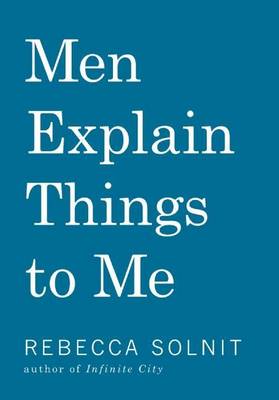
clementine
In particular, the titular essay was strong, I thought:
But explaining men still assume I am, in some sort of obscene impregnation metaphor, an empty vessel to be filled with their wisdom and knowledge.
Another strength of this book is how quick and easy it is to get through. I read it in one rather short sitting, making it a very accessible primer to feminism - moreso than, say, another popular collection of feminist essays, [b: Bad Feminist|18813642|Bad Feminist Essays|Roxane Gay|https://d.gr-assets.com/books/1421292744s/18813642.jpg|26563816]. (I did love Bad Feminist, but it certainly required multiple sittings to finish!)
That said, I did have some not insignificant issues with Men Explain Things To Me. In particular, I was not impressed with Solnit's reliance on using "the Middle East", India, and various African countries as a baseline for female oppression. I understand that her intention was to showcase that violence against women, misogyny, etc happens everywhere, and is a rampant problem in the United States, where she is from - but I felt that she was using these countries as almost a shock tactic, like, "See, we're as bad as THESE countries!" Almost every time she mentioned some terrible event in the US, she'd compare it against a similar event in India or "the Middle East" (she rarely specified countries in that region, because the Middle East is totally homogenous, obviously).
I mentioned Bad Feminist earlier; one thing that really stood out to me in that book was Gay's mention of Caitlin Moran's anti-burqa statement. Solnit engages in some Moran-like behaviour in her essay "Grandmother Spider" (although perhaps not quite as obtusely), by insisting that burqas are a tool to make women disappear, and that women who wear them disappear into the background, like furniture.
I also wasn't a huge fan of Solnit's constant #NotAllMen-type reassurances that she totally loves a lot of men and there are a lot of men in the world who aren't evil and blah blah blah. To be fair, I realize that feminism still isn't necessarily accepted in the mainstream, and that some concessions need to be made in order to get people to actually read your book. It's just, I don't know, when I pick up a book of feminist essays I don't need the author to tell me multiple times that there are, like, soooo many great men out there, y'all! Because I know that, obviously. I just want to read the damn essay without the author having to backtrack and cover her ass.
These gripes are not completely overpowering, but they are not small either. I think this book has merit, and I'd be interested in checking out some of Solnit's other work solely based on her ability as a writer. But there were themes throughout the book that definitely pulled me out of the essays and kept me from enjoying them fully.
